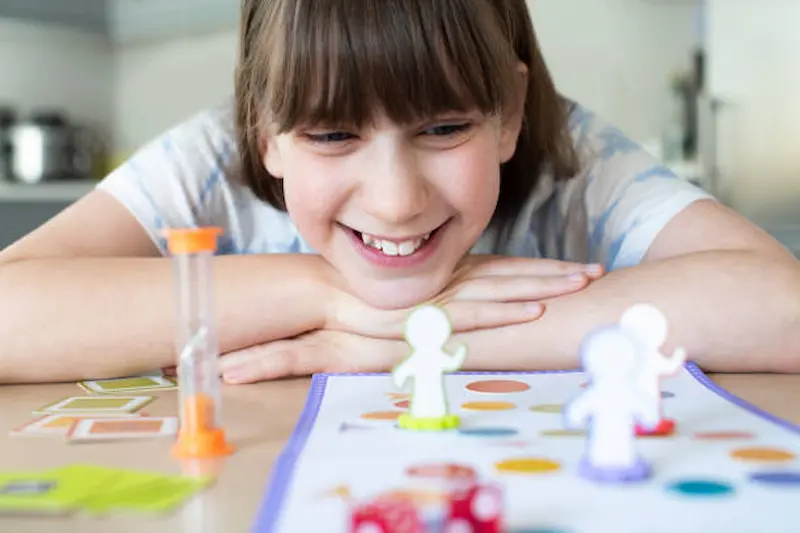Math learning games are interactive activities designed to teach and reinforce mathematical concepts through play. These games transform abstract ideas into engaging challenges, making learning enjoyable and effective. By incorporating elements of fun and competition, math learning games not only enhance comprehension and retention but also cultivate a positive attitude towards mathematics. This approach encourages a dynamic and interactive learning experience that complements traditional teaching methods, promoting a lifelong love for math.
In this blog, explore the transformative power of math learning games, delving into their interactive nature that turns mathematical concepts into engaging challenges. Discover how these games make learning enjoyable, promote comprehension, and foster a positive attitude towards mathematics, creating a dynamic and effective educational experience.
Table of contents
- Game 1: Math Bingo
- Game 2: Math Puzzles
- Game 3: Math Scavenger Hunt
- Game 4: Math Board Games
- Game 5: Math Apps and Websites
- Integrating Math Games into Curriculum
- Personalized Learning with Math Games
- Overcoming Challenges
- Parent and Teacher Roles
- Math Game Resources
- Measuring Success
- Conclusion
- Frequently Asked Questions ( FAQs )
Game 1: Math Bingo

A. How to play Math Bingo
Math Bingo is a dynamic educational game suitable for all ages, fostering a love for numbers. Each player receives a bingo card with various math problems, replacing traditional numbers. The game leader calls out equations, and participants mark corresponding answers on their cards. The engaging competition adds an element of excitement, making learning math enjoyable and interactive. This approach aligns well with Brighterly math classes, where interactive methods are key to building strong math foundations.
B. Variations and themes for Math Bingo
Inject creativity into Math Bingo by introducing diverse themes such as animals, geography, or history. This customization not only captures players’ interest but also expands their knowledge beyond basic arithmetic.
Additionally, incorporating different math operations like multiplication or division provides a challenge suitable for varying skill levels, ensuring inclusivity in the learning process.
C. Educational benefits of Math Bingo
Beyond the thrill of the game, Math Bingo offers substantial educational advantages. It enhances mathematical proficiency, cultivates mental calculation speed, and instills a positive attitude toward learning mathematics. The interactive nature of the game encourages collaboration and critical thinking, making it a valuable tool for educators and parents seeking innovative ways to reinforce mathematical concepts. This fun & educational activity for kids can be easily adapted to different learning environments, making it a versatile and effective educational resource.
Game 2: Math Puzzles

A. Types of math puzzles
Math Puzzles offer an engaging way to enhance logical reasoning and problem-solving skills. There are various types, from Sudoku and cross-number puzzles to logic puzzles and riddles. Each type targets different aspects of mathematical thinking, providing a diverse range of challenges suitable for all ages. For young learners, puzzles tailored to their level can be particularly beneficial, fostering a fun and educational environment that encourages the development of essential cognitive skills. Puzzles for kids not only make mathematics enjoyable but also contribute to the overall growth of their analytical abilities.
B. How to create your own math puzzles
Crafting a custom math board game adds an element of creativity to learning. Define rules, incorporate math problems as challenges, and design a thematic board.
This process not only enhances understanding but also allows tailoring to specific educational goals. Engaging in such activities fosters critical thinking skills for kids, encouraging them to strategize, problem-solve, and apply mathematical concepts in a playful and interactive manner.
C. Solving math puzzles for skill development
Solving math puzzles promotes critical thinking, pattern recognition, and strategic planning. As individuals tackle various puzzles, they enhance their problem-solving abilities and develop a resilient approach to mathematical challenges. The iterative nature of puzzle-solving nurtures perseverance and cultivates a positive attitude toward overcoming mathematical obstacles, making it an effective tool for skill development and fostering a love for problem-solving.
Game 3: Math Scavenger Hunt

A. Setting up a math scavenger hunt
Math Scavenger Hunts transform learning into an adventure. To set up, identify locations relevant to the learning environment, whether indoors or outdoors. Create a list of math-related items or problems that participants must find or solve at each location. Incorporate challenges appropriate for the participants’ skill levels to maintain engagement.
B. Math concepts and clues for the hunt
Tailor the scavenger hunt to reinforce specific math concepts. Integrate clues that require participants to apply mathematical operations or solve problems related to the environment. For example, provide clues like “Find an object with a surface area of 25 square units” or “Count the number of right angles in this room.”
This not only reinforces learning but also encourages practical application of mathematical knowledge.
C. Collaboration and learning through scavenger hunts
Math Scavenger Hunts foster collaboration and teamwork as participants work together to decipher clues and locate items. The interactive nature of the game promotes social interaction, communication, and the sharing of mathematical strategies. This collaborative learning experience not only strengthens mathematical skills but also instills a sense of camaraderie, making it an effective and enjoyable method for reinforcing mathematical concepts.
Game 4: Math Board Games

A. Popular math board games
Explore engaging math board games like “Monopoly,” “Catan,” or “Prime Climb,” which seamlessly integrate mathematical concepts into gameplay. These classics not only entertain but also reinforce numerical skills, strategy, and critical thinking.
B. Designing your own math board game
Crafting a custom math board game adds an element of creativity to learning. Define rules, incorporate math problems as challenges, and design a thematic board. This process not only enhances understanding but also allows tailoring to specific educational goals.
C. Educational value of math board games
Math board games facilitate active learning, promoting strategic thinking, problem-solving, and numerical fluency. These games make math enjoyable, fostering a positive attitude towards the subject while simultaneously honing essential cognitive skills.
Game 5: Math Apps and Websites

A. Best math apps and websites for learning
Discover top-tier math apps and websites like Khan Academy, Prodigy, or Photomath, offering interactive lessons, quizzes, and adaptive learning. These platforms cater to various age groups, ensuring a comprehensive and personalized learning experience.
B. Features and benefits of math apps
Math apps boast features such as gamified learning, real-time feedback, and progress tracking.
These elements make the learning process engaging, effective, and tailored to individual progress, promoting a deeper understanding of mathematical concepts.
C. Safety and parental controls for online math resources
Ensure a secure online learning environment by leveraging parental controls and monitoring features on math apps and websites. Prioritize platforms with strong safety measures to provide a secure space for children to explore and enhance their mathematical skills.
Integrating Math Games into Curriculum
Incorporating math games into the curriculum enriches learning by providing a hands-on and engaging approach to mathematical concepts. Teachers can seamlessly align games with lesson plans to reinforce key skills, cater to diverse learning styles, and make abstract concepts more tangible. This integration not only enhances understanding but also promotes a positive attitude towards math, creating an interactive and effective educational experience for students.
Personalized Learning with Math Games

Personalized learning with math games, particularly learning games for kids, tailors educational experiences to individual needs. Through the use of interactive games, educators can effectively address diverse learning styles and paces within the classroom. This approach not only encourages a deeper understanding of mathematical concepts but also enables students to engage in activities that are aligned with their preferences and skill levels. Learning games for kids specifically promote self-directed exploration, empowering learners to reinforce key skills while immersing themselves in a dynamic and adaptive learning environment.
Overcoming Challenges
Addressing challenges in implementing math games, including educational games for kids, involves fostering a supportive environment. Educators can overcome resistance by highlighting the educational benefits of these games and emphasizing their alignment with curriculum goals. Providing guidance on proper game selection and ensuring accessibility for all students promotes inclusivity. By actively addressing challenges and garnering support, educators can successfully integrate math games, including educational games for kids, into the learning process, maximizing their potential as effective and enjoyable educational tools.
Parent and Teacher Roles

Parents and teachers, embracing positive parenting strategies, play vital roles in optimizing the impact of math games on a child’s education. Collaborate to identify suitable games aligned with the curriculum and students’ needs. Regularly monitor game usage, ensuring a balance with other learning methods to promote a holistic educational experience. Encourage discussions about the mathematical concepts learned during gameplay and provide additional support when necessary.
Through active engagement in the learning process, parents and teachers enhance the effectiveness of math games as valuable tools for reinforcing mathematical skills and fostering a positive attitude towards learning in children.
Math Game Resources
Accessing a variety of math game resources, including platforms like Coolmath Games, ABCmouse, and Hooda Math, enriches educational experiences for children. These online resources offer a diverse range of math games tailored to different skill levels and age groups, including math games for kids. By blending entertainment with education, these platforms make learning enjoyable and effective. From interactive puzzles to engaging simulations, math game resources provide a dynamic supplement to traditional teaching methods, fostering a positive and interactive approach to mathematics.
Measuring Success

Evaluating the effectiveness of math games, including online games for kids, involves assessing both quantitative and qualitative indicators. It is essential to track students’ progress in mathematical proficiency and problem-solving skills as they engage with these interactive online activities. Additionally, educators should observe students’ levels of engagement, enthusiasm for learning, and the practical application of acquired knowledge within the context of these digital games.
Regular assessments and feedback mechanisms play a crucial role in gauging the impact of math games, allowing educators to tailor strategies for continued success and create an enriching learning environment that integrates the benefits of online games for kids into the educational experience.
Conclusion
Math learning games are interactive tools designed to teach and reinforce mathematical concepts through play. These games not only make learning enjoyable but also enhance problem-solving skills, critical thinking, and numerical fluency. By combining education with entertainment, math learning games engage students in a dynamic learning process, promoting a deeper understanding of mathematical principles and cultivating a positive attitude toward the subject.
To get your hands on more such articles, educational content, and free resources on coding for kids, robotics courses, game development, etc., check out the BrightCHAMPS Blog Page now!
Frequently Asked Questions ( FAQs )
A1. Math games are designed for various age groups, from preschoolers to adults, offering age-appropriate challenges.
Q2. Can these games be used as a primary learning tool?
A2. While beneficial as supplementary tools, math games are most effective when used alongside traditional teaching methods rather than as primary learning tools.
Q3. Are there any free options available for math learning games?
A3. Yes, many math learning games offer free options, providing accessible resources for learners without cost barriers.
Q4. How much time should a child spend on math games per day?
A4. A recommended guideline is 20-30 minutes per day, allowing for effective skill reinforcement without overwhelming the child.
Q5. What are the potential drawbacks of using math learning games?
A5. Potential drawbacks include overreliance, so balance is crucial; excessive screen time may impact other developmental aspects; and not all games may align perfectly with specific curriculum objectives.


 We are an army of educators and passionate learners from BrightChamps family, committed to providing free learning resources to kids, parents & students.
We are an army of educators and passionate learners from BrightChamps family, committed to providing free learning resources to kids, parents & students.
























